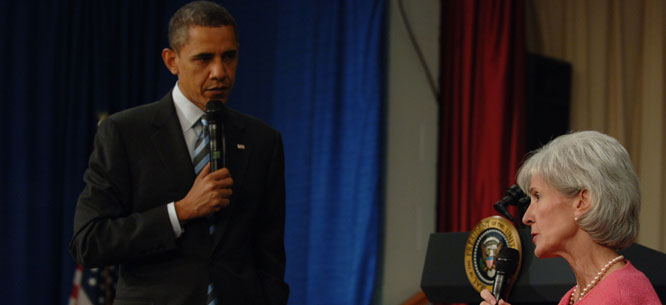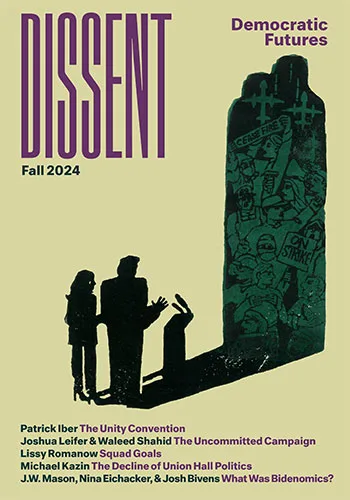Can Progressives Do Big Things? Obamacare Is the Test
Can Progressives Do Big Things? Obamacare Is the Test
Obamacare will help all Americans in significant ways, yet it remains controversial. What will it take for the program to join Medicare and Social Security as a permanent part of America’s system of social insurance?

President Obama is fond of saying, “We do big things.” There’s no question that the Affordable Care Act (ACA) qualifies. It’s the most sweeping piece of social legislation since the passage of Medicare and Medicaid in 1965.
Along with the labor movement, Medicare, Medicaid, and Social Security helped create a larger American middle class. Making affordable health care a right is the next crucial step toward financial security for millions of individuals and families.
So the success of the law is vital, and so too are the tough political questions it raises about the ability of progressives to build public support for reform and win other Big Things in the future.
Obamacare will help all Americans in significant ways, regardless of whether they currently have insurance, and it may shape public opinion about the role of government for years to come. So what will it take for Obamacare to achieve the same political status as Social Security, Medicare, and Medicaid?
One of the central characteristics of Medicare and Social Security is that they benefit everyone in the same way. The universality of the programs is key to their success. Rich or poor or anywhere in the middle, we all depend on these programs in our retirement.
Medicare and Social Security survive because they have organized beneficiaries and their families into a powerful and nonpartisan coalition. Voters with political power—except ideological partisans and the super wealthy—understand they have the same interests in Medicare and Social Security as do voters without it. When the bipartisan and cross-class support of these benefits gets attacked (as when President George W. Bush proposed privatizing Social Security) the support holds up.
Obamacare is different because it is not an obviously universal program. It guarantees and improves everyone’s health security, but it does so for different people in different ways and at different times in their lives.
Obamacare makes private insurance, Medicare, and Medicaid better for those who have them, and it unlocks the door to insurance and public benefits for those who don’t. It performs both of these functions while bringing down costs for consumers and businesses and improving the quality of care.
Unlike Medicare, the challenge is that even most supporters can’t succinctly and simply describe what Obamacare does. Yes, it provides coverage to 25 million Americans without insurance. But it does much more than that, and focusing only on the uninsured leaves out the 85 percent of already insured Americans who must connect personally with Obamacare as a program designed for them.
The big challenge for progressive supporters of the ACA, therefore, is twofold. First, we need to bundle all the different benefits, consumer protections and new coverage opportunities into a whole that’s understandable, under a name that is easy to associate with a good program. Second, we have to help people understand that we all benefit from the same health care law and have an equal interest in protecting, promoting and improving it. No matter how diffuse and vast the law might seem, there’s a piece of Obamacare which will protect each one of us and our families.
The best way to build the Obamacare coalition is to help people learn that they’re already in it and that Obamacare will be as universal as Social Security and Medicare.
Relentless Attacks
The legislative debate over Obamacare helped fuel a rabid right-wing resurgence on a host of issues. The Democrats lost their House majority to the most reckless and extreme GOP caucus in modern history. Nearly four years after its enactment, Obamacare continues to be the hub around which the biggest political battles revolve. Many Republican governors and state legislators take every opportunity to sabotage the law. Nationally, the Republicans are making repeal one of their top electoral issues. House Republicans have tried nearly 40 times (as of July 17, 2013) to repeal it. When a conservative Supreme Court upheld the ACA, opponents were undaunted. For the fringe right and the Republican establishment alike hating Obamacare is a proxy for hating all government, not to mention the President.
This has been a brutal fight and it’s remarkable that the law is still standing. The polls show that the concept of Obamacare is supported by a minority of Americans and a majority have concerns about implementation (although a majority oppose outright repeal). Too few people understand it, especially those who will benefit the most from the law. The trend lines show that public opinion has been relatively static. But the numbers also show a pathway toward changing public opinion and building lasting support for the law.
Moving Public Opinion
The discussion about Obamacare and public opinion by the political class and some of the media has been as frustrating as the polling numbers. Pundits constantly ask why the law is not more popular. Instead they should be marveling at how much support it has in the face of the sustained campaign against it. The entire Republican Party, the Koch brothers, the U.S. Chamber of Commerce, the health insurance industry, and the Tea Party have dedicated themselves to spreading lies about the law in hopes of bringing it down. Opponents have outspent supporters five to one on television ads. But all of the money and effort of opponents has had virtually no impact on the law’s support over time.
In fact, many of the law’s specific benefits and consumer protection provisions have overwhelming and consistent popular support. For example, eliminating insurance company discrimination based on age, sex and health status often polls at 70 to 80 percent approval. It turns out that people don’t like it when insurers deny their coverage, drop them when they’re sick or impose premium surcharges for a health condition, and the public is happy to see these practices outlawed. The public is also happy that millions of seniors are receiving prescription drug discounts adding up to billions of dollars. Strong public support for these and numerous other ACA provisions form the basis for changing opinion over time.
Obamacare is also more popular than the federal prescription drug benefit for seniors (Medicare Part D) was at the time it went into effect in January of 2006, according to a study by Georgetown University’s Center on Health Insurance Reforms. Polls showed the new Medicare program was less popular than the ACA, and fewer Americans understood how it worked.
And few commentators put the poll numbers in context. It’s hard not to point out, for example, that the law’s namesake stood for re-election a year ago and trounced the other guy. On its worst day, Obamacare is twice as popular as the Republicans in Congress.
Everyone has a different theory about how to improve public opinion about the law. Here’s mine:
Moving Forward
Ensuring that the law rolls out successfully is a political imperative with significant implications for the remainder of the Obama presidency and the 2014 and 2016 elections. If the Democrats were to lose control of the Senate, President Obama would likely spend his last two years in the White House regularly vetoing bills to repeal the ACA, and the battle over health care and the role of government would define the 2016 presidential election. The law would remain in place but with an uncertain status.
In the face of obstacle after obstacle, the Department of Health and Human Services (HHS) has been moving quickly to implement an enormously complex and technically challenging law. There are plenty of bumps in this road, but the work is getting done. There are some big political challenges too, especially the refusal of many Republican governors and lawmakers to accept billions of federal dollars to extend Medicaid to an expanded eligible population.
How do we help Obamacare clear the next round of political hurdles and begin to move towards joining Social Security, Medicare and Medicaid as part of America’s permanent system of social insurance? Here are three ways:
1. Run a successful enrollment campaign.
The most important immediate objective is to enroll as many people as possible into the new insurance marketplaces. To do this, an extraordinary collaborative effort has been formed involving health care advocacy organizations, labor unions, providers, houses of worship, small businesses, big corporations, insurers, agents and brokers and more. For example, organizations like Enroll America and SEIU are running technically sophisticated campaign-style operations to reach millions of people with one-on-one conversations. Planned Parenthood and community health centers are enrolling people at their sites. MomsRising is leading a program to encourage mothers to talk with their adult children, especially young men, about signing up for coverage. The president is using his bully pulpit. State health insurance marketplaces are running creative multimedia ad campaigns.
Enrollment will be seen as a key indicator of whether or not the law is working. The number to watch is 7 million, including 2.7 million between 18 and 35—that’s how many people the Obama Administration said it hopes will sign up in the marketplaces by the end of March 2014. This is only part of what the law does, but it’s the most visible, and we need to meet or exceed expectations.
2. Help the law become a “big idea” and something personal that matters to people.
We must promote every other aspect of the law and help working- and middle-class families understand that all of the different pieces of the ACA are interconnected. We have to start by putting people at ease. In the case of workers who get insurance from employers, especially large companies, people want to hear that their health plans probably won’t change at all. They’ll keep their same insurance cards and go to the same doctors. Once they know that, they’ll be able to hear all the ways their existing benefits will improve.
We have to talk about how Obamacare makes a concrete difference to people. Life is less stressful without overwhelming medical bills. People will have new freedoms, like the ability to leave a job or start a business when insurance companies are finally barred from turning anyone down because of a so-called “pre-existing” condition. Seniors will worry a little less about making ends meet because of prescription drug discounts. Insurance companies will no longer be able to charge women significantly higher premiums than men. All of this adds up to family security, and that’s a value that’s universally shared.
3. Hold Opponents Accountable and Support Reformers
We have to create a clear public narrative that leaves no doubt that there are two diametrically opposed sides in this fight—policymakers who support Obamacare and side with consumers, and those who support repealing Obamacare and putting the insurance companies back in charge of our health care. We have to inoculate supporters against attacks and smack down opponents with grassroots organizing and TV ads. When Republicans talk about repealing Obamacare, we should say what they really mean—putting every senior and family at the mercy of the insurance industry and getting rid of every benefit and consumer protection in the law, like the ban on discrimination based on age, sex and health status. We have to help people benefiting from the law to publicly tell their stories and thank supporters in Congress for standing up for them. We have to show that supporting health reform is both morally right and politically smart. Reform advocates are already working on this effort.
Building a More Powerful Progressive Movement
In the final analysis, elevating Obamacare above politics, making it permanent and transforming it into a solid government brand requires a stronger progressive movement than we have today. This is hardly a novel idea, but the current circumstances make it an urgent one.
After a 100-year struggle, we won a new social insurance program that has infuriated the forces of austerity and free-marketeers and will likely remain under constant attack. If the ACA doesn’t succeed, how will people believe government can make a real difference in their lives? Championing the law can’t simply be the responsibility of health reform groups and unions such as AFSCME, NEA, and SEIU. It has to be everybody’s fight, just as the battle over reproductive rights can’t be waged only by women’s organizations.
The government expansion related to Obamacare occurred despite the fact that taxes as a percentage of GDP are at historically low levels that are unsustainable for the operation of effective public services. We can only overcome this if Obamacare is doing well. People have to value what government does before they agree to greater taxes no matter how fair the taxes are.
If we want to make more gains, we have to offer an aspirational vision for how joining together through government can make people’s lives better, and we can credibly do that only if the signature program of our generation is effective and has popular support.
Second, the right wing is working to nullify the basic tools working people have used to build power and make progress—organizing unions and electing good candidates to office. Across the country the Republicans have been running anti-union and voter suppression campaigns, and they’ve been successful at the state and federal levels and at the U.S. Supreme Court. Can we really win anything of consequence in the future if our base is denied the right to vote by voter I.D. and other laws and if workers can’t build politically powerful organizations? We have to find a way to resist these assaults while we pursue a proactive agenda for change.
Lastly, winning elections is not enough. We have to build permanent organizations that don’t rise and fall based on the success of a single politician, no matter how well that person performs. We especially have to support the community groups affiliated with national networks such as the Alliance for a Just Society, Center for Community Change, Leadership Center for the Common Good, National People’s Action, PICO and USAction. The phenomenon of Barack Obama in the White House is no substitute for an independent movement that can pressure elected allies to do more. This has been evident in every major issue fight since the president’s election.
The future of Obamacare is inextricably linked to the ability of progressives to build lasting organizations that take action where people live and work. Mobilizing for specific campaigns is not enough, and we shouldn’t settle for that kind of opportunistic organizing, even though we’ve all done this to beat back immediate threats.
Health care is at the center of our collective demands for economic security, racial justice, gender equality and a fairer distribution of wealth in our society. Winning the battles over Obamacare will advance those and other issues, and help to unite disenfranchised communities and economically squeezed working- and middle-class families to win Big Things and build a better America.
Ethan Rome is executive director of Health Care for America Now (HCAN), the nation’s leading grassroots health care coalition. He has been a community and labor organizer for more than 25 years.





